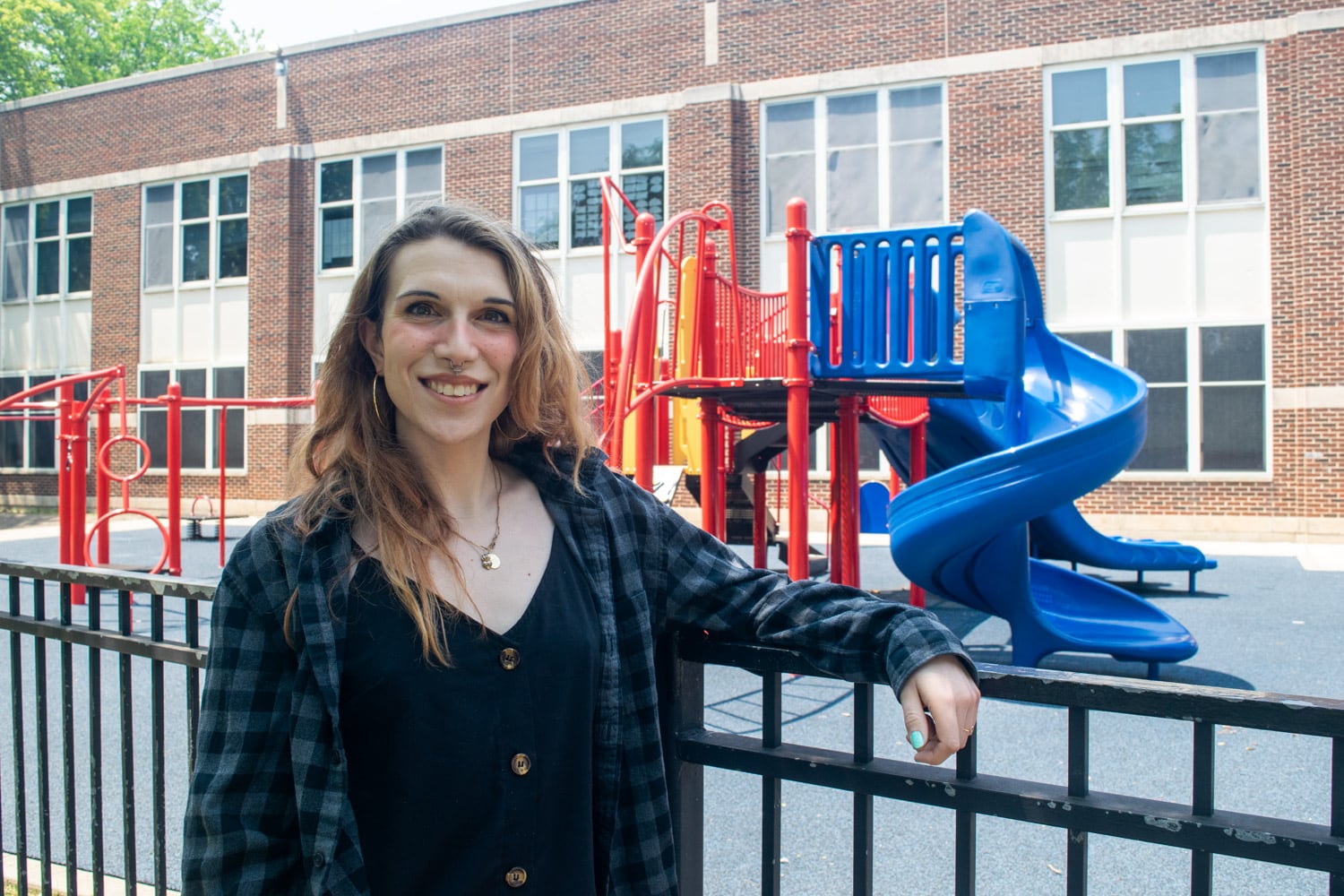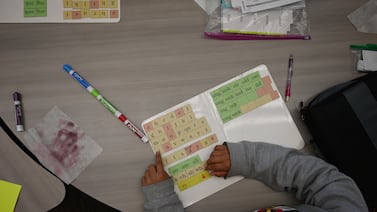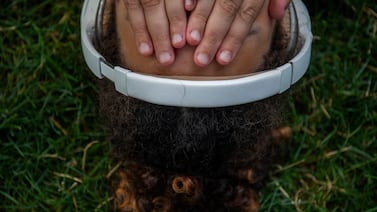Sign up for Chalkbeat’s free monthly newsletter How I Teach to get inspiration, news, and advice for — and from — educators.
Eva Padilla knows that kids are more than their report cards. When she was young, she was labeled a “problem child.”
“I had a teacher in sixth grade who decided to see me as a student rather than a problem,” Padilla said. “I remember getting a report card back in sixth grade. It’s all Fs and Ds, and then one little B in social studies, and it planted that seed in my mind – like, maybe I can actually be a student.”
Now, Padilla — a substitute and resident teacher until this point — is looking forward to her first year running her own classroom in Chicago Public Schools. After growing up listening to stories about her mom’s years as a teacher, she wants to build on that legacy. Her mom had taken a break to raise her kids; she planned to return to the classroom when they were older, but she died of cancer before she could get back to teaching.
“Later on in life, I learned she had a student who had gotten pregnant, and my mom was the first person who she called,” Padilla said. “My mom helped her with everything that she was dealing with — how worried she was and how anxious. When I heard that story, I was like, ‘I want to be a teacher like that. I want to be someone who a kid can feel like if there’s no other place in the world they can feel safe or supported, at least within this classroom, they can.’”
Padilla is also paving her own path as a trans woman teaching in CPS. After struggling with student teaching, she decided to return to teaching after the pandemic hit.
At the time, she had been working as a canvasser for the U.S. Census Bureau. Unable to go door-to-door during lockdown, she thought a lot about what was next for her. It was during this time that she began her social and medical transition. That summer of 2020, she also started mentoring queer youth for a program hosted by Chicago Alderpersons Matt Martin, Rossana Rodriguez, and Andre Vasquez.
“Doing that and working with these amazing young people, I was like, I gotta go back to teaching,” Padilla said.
She started subbing at CPS three years ago and recently wrapped up a year of resident teaching at Chicago Academy High School, where she will work as a special education teacher in the fall. Padilla spoke recently with Chalkbeat.
This interview has been lightly edited for length and clarity.
What has it meant for you to be a mentor for LGBTQ kids?
I didn’t meet another trans woman until I was 20 years old. There was a lot of hatred, a lot of terrible stereotypes that I saw growing up. So being a mentor for these students means the world to me. I may not change their life, but I can just let them know that if you need someone, there is a queer person in your life that you can talk to. My queerness is not the main attraction or feature of the classroom. It’s just an organic part of it.
Is there a community that you’ve found among other trans teachers?
I found some community in it – there aren’t an awful lot of us, especially trans women. I am only aware of two other trans women who are salaried teachers in CPS. Every school that I’ve been at, I’ve been the only trans woman there. It’s difficult to be in that position because you have to serve as the welcoming committee. You have to stand up for yourself and be secure in your identity. You also have to deal with some people who don’t understand you. More than being difficult for you, it’s a disservice to their trans students. So sometimes you have to help guide them, and you have to take some things on the chin and some misunderstandings. Being an adult, that’s kind of your responsibility.
What is your favorite lesson to teach?
I love to teach lessons that are informed by my students and are representative of their cultures. It gives students — if they choose to do so — the spotlight if they want to be a wellspring of information for the class. Other times, a student is able to learn more about a culture or an identity that they hadn’t been fully aware of, and sometimes that’s even our own. I remember being in college, learning about Puerto Rican history. That was something, even though I’m Puerto Rican, I never learned about in school.
Tell me about your own experience in school and how that’s affected your work today.
I was in a community that was [nearly all] white, and I grew up with a Latino dad and a white mom. There were some really good teachers, but a lot of things in school were indoctrination into white supremacy, indoctrination into anti-Blackness.
That shaped a lot of my experiences growing up, because I had to unlearn a lot of things to undo internalized racism. Education and learning about history was my sanctuary. Learning about the history of oppressed people, queer history, Latino history — it really changed my life, to be able to feel that these narratives that I was always hearing from white people in this community weren’t true or that they were grossly mistaken.
What’s something happening in your surrounding community that affects what’s going on inside your classroom or your school?
I guess to bring it back to the LGBTQ community, I have students who talk with me about their parents disagreeing with them being queer because of their religion, because of societal pressures, [because of] what the neighbors will think. There’s also these narratives about trans teachers and queer teachers being “groomers.” So I have to sift through those things in order to best support those students. We’re in this together, where I want to provide the best support I can to students and give them the space to be themselves while also giving myself the space to be myself.
How do you make your classroom your own – if you have the chance to do that?
I’ve never been able to really make my own classroom because I’ve been a substitute teacher and a resident teacher. So this year is going to be the first. But towards the end of last school year, I got a random shipment of books. I said, “I’m going to use this to make a class library.” I went on my Twitter, and I had a bunch of people send me books for the classroom. Getting students to enjoy aspects of reading, it makes my heart sing; it truly does.
What’s one thing that you’ve read that you feel like has made you a better educator?
It’s kind of a strange pick, but I would say “October” by China Miéville. He’s mostly a fantasy author, and he ended up writing a whole history of the October Revolution.
Though I don’t agree with everything in the book, I think of that book when I think about the joy of teaching history. When I hear people say, history is just the facts, it makes me want to pull my hair out. It’s not reading off a timeline. It’s not just about facts and dates. It’s about narrative. That’s one of my main goals: to have people love learning about the past, to inform their future, and to make their own stories going forward. And to know that people made history — regular people like you and I — and that they can do the same going forward. They have agency in their lives. They have power. And there’s such incredible beauty in that.
How do you take care of yourself when you’re not at work?
I play in a band; I love getting to perform and work on songs. And I play the card game Yu-Gi-Oh, and that’s really a good outlet.
What is one thing you’re looking forward to next school year?
I’m really looking forward to finally being able to lead a classroom and have a space that I can craft with students. Each year is a whole new group of students to care about, support, learn from, and teach with. Some students just don’t vibe with you, and that’s okay. But I love winning over students — to [get them] loving education and enjoy being in our classroom. So I always look forward to that.
Max Lubbers is a reporting intern for Chalkbeat Chicago. Contact Max at mlubbers@chalkbeat.org.








